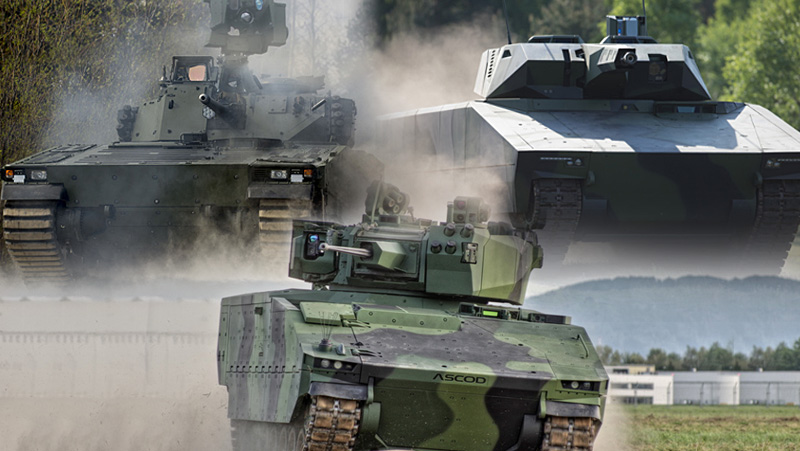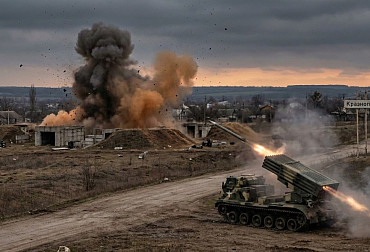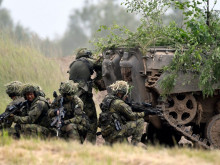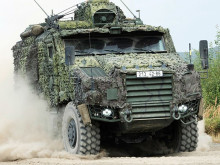Czech Companies Such as Ray Service Still Waiting to See How the Military Project of the New IFVs Turns Out
Rheinmetall and Ray Service recently signed a cooperation agreement. In the event that Rheinmetall and its Lynx vehicle succeed in the competition for new IFVs for the Czech Army, Ray Service will manufacture the vehicle’s complete nervous system: the complex cabling that connects its systems to exchange information and respond to crew commands. The concluded agreement concerning the Czech IFV is contingent on the termination of the tender, but in addition it brings a certain business for Ray Service: subcontracting for the Lynx project for the Hungarian Army.

Picture: The highest planned investment of the Ministry of Defence this year is the first amount spent on the acquisition of tracked IFVs. (illustration photo) | CZD archive / CC BY-NC-ND
Ray Service is known for its active approach to the armaments projects of the Ministry of Defence and is a popular industrial partner for foreign suppliers, whose work can secure a significant part of the Czech industrial stake, which the Ministry of Defence usually requires.
The problem with all similar agreements and memoranda is that if the Ministry of Defence is not able to complete the IFV project, they will remain a mere declaration of possible cooperation, which will not actually be fulfilled.
The flagship project of the modernization of the Czech Armed Forces, the acquisition of new IFVs, is stuck in a situation where enormous efforts have been made to implement it not only by three competing foreign companies, but also by Czech industry.
Unique know-how and opportunities for cooperation
At the same time, the IFV project represents a huge impetus for its modernization, the acquisition of new know-how and, last but not least, an important business and job guarantee for thousands of people, often in specific fields with high added value.
An example is Ray Service, which recently signed a cooperation agreement with Rheinmetall, whose vehicle is considered the favourite of the tender. Ray Service will manufacture essential cable harnesses, electromechanical units and outdoor lighting systems based on the signed agreement for the LYNX program.
However, it will also provide important third-party components and equipment, including, for example, NBC protection by the Beth-El company, Kidde Deugra fire safety systems and Defence Service Tracks tracks and wheels. The company from the Staré Město near Uherské Hradiště also has a cooperation agreement with these companies and can activate it for the Lynx project.
However, the cooperation between the companies works regardless of the Czech tender for IFVs. A typical example is Hungary, which coincidentally managed to purchase IFVs. The Hungarians will acquire Lynx machines from Rheinmetall and Ray Service will participate in this contract, thanks to the agreement with Rheinmetall. Ray Service will also supply cabling for 24 self-propelled howitzers Panzerhaubitze 2000 (PzH 2000) for the Hungarian army, also from Rheinmetall. There could be similar potential if other V4 countries acquire weapon systems from Rheinmetall.
However, the domestic reference order, i.e. the IFV project for the Czech Army, is very valuable for these and other potential orders. In the IFV project, the ball is now clearly on the side of the Ministry of Defence of the Czech Republic.
Will the Ministry finish its key project?
The problem is that if the Ministry of Defence does not complete the IFV project by the end of the October elections for the Chamber of Deputies, all contracts, agreements and memoranda on the participation of Czech industry in the tender will be just a piece of paper (and a component folder of unnecessary electronic documents).
At the same time, the IFV project represents a significant economic stimulus for the Czech defence industry and the entire Czech economy in times of the coronavirus crisis. This project even has an existential significance for the state enterprise VOP CZ, which the project envisages as a key Czech industrial partner.
However, there is only silence regarding the IFV project. The three competing companies have very limited possibilities for public communication, but it can be assumed that the Ministry’s approach is rather frustrating. Despite the many times declared willingness to buy IFVs, not only by Defence Minister Lubomír Metnar, but also by Prime Minister Andrej Babiš, nothing has happened in the project since the submission of preliminary offers in October 2019 (!).
And there are “only” two steps left for the Ministry to take. Test three vehicles in Vyškov and invite companies to submit final offers (and provide them with the necessary documentation). The Ministry’s inaction cannot be attributed to a pandemic: In a situation where the military is fulfilling its tasks and large industrial enterprises are in full swing, an action in which a team of several dozen people will evaluate the performance of three pieces of equipment is no epidemiological risk if the participants adhere to standard protective measures.
Will the government waste a unique opportunity?
The project with a budget of 50 billion means a huge opportunity for its Czech suppliers. These are contracts worth up to CZK 25 billion for top Czech companies, such as Meopta, Tatra, Mesit, EVPÚ Defence or Quittner & Schimek in addition to Ray Service.
And as studies show, every penny spent in the Czech defence industry multiplies several times in the supply chain. The task of the Ministry of Defence is to ensure the modernization of the army, but in addition, its goal should be to support the existence of an industrial base in our state territory, which will allow to operate sophisticated weapon systems.
If the IFV project is not finalized by the autumn elections, the whole competition will probably fall apart. This would be a failure of the Ministry of Defence and would mean a reduced defensive capacity of the Czech Republic and, last but not least, damage to the country’s position as a credible member of NATO. The Ministry of Defence would also lose public credit, on the basis of which money flows into the Defence budget.
Czech companies will therefore have no choice but to focus on what, unlike an unreliable domestic customer, can ensure their survival: the export and delivery of goods and services to countries where they can buy military equipment. As is the case with the example of cooperation between Rheinmetall and Ray Service on projects in Hungary.



















